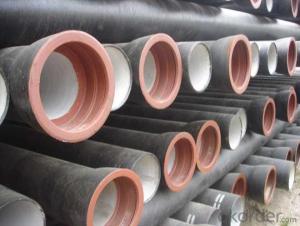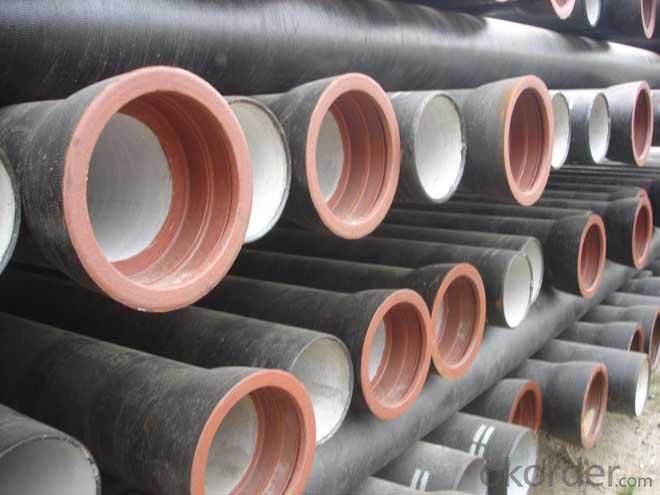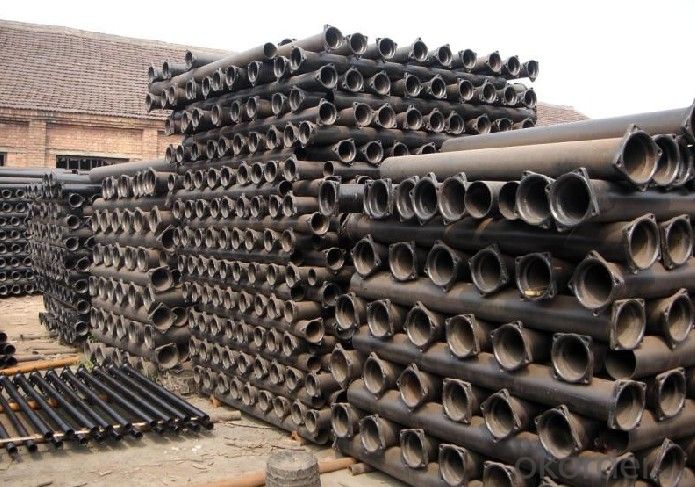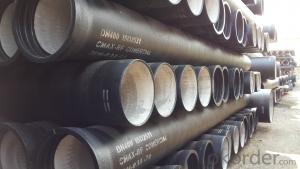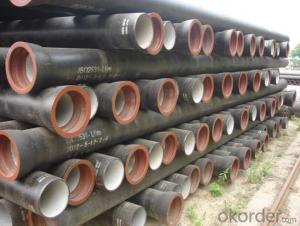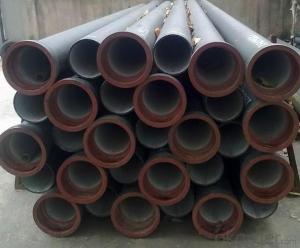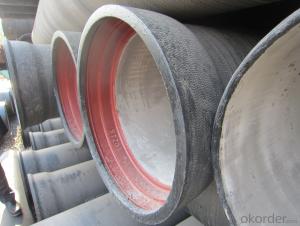Ductile Iron Pipe of China C40 EN545/EN598/ISO2531 on Chip Price
- Loading Port:
- China main port
- Payment Terms:
- TT or LC
- Min Order Qty:
- 23 m.t.
- Supply Capability:
- 500000 m.t./month
OKorder Service Pledge
OKorder Financial Service
You Might Also Like
1,Ductile Iron Pipe Description :
1) Pipes confirm to ISO2531,K9 class,T type joint,6m long,with inside cements lining conform to ISO4179, outside Zinc spraying(130g/m2) and bitumen coating(70μm) conform to ISO8179.
2) Pipe ends: Spigot and socket ends, with 100% SBR rubber gaskets accoding to ISO4633
3) we can do third party inspection according to customer's request.
4) Our products have been sold to many international market, such as Middle East and South East Asia and Africa.
2,Main Features of the Ductile Iron Pipe:
1. Material: Ductile iron grade 500-7/ 450-10 in accordance with ISO1083
2. Standard: ISO 2531, EN545, EN598, ANSI, AWWA
3. Certificate: ISO9001, ISO14001, SGS, NSF, WRAS
4. External coating: Zinc + Bitumen, conform to ISO8179
5. Rubber: NBR, SBR, EPDM according to ISO4633 / EN681.1
6. Note: The gaskets, bolts & nuts are supplied respectively as your special requirement
3,Ductile Iron Pipe Images:
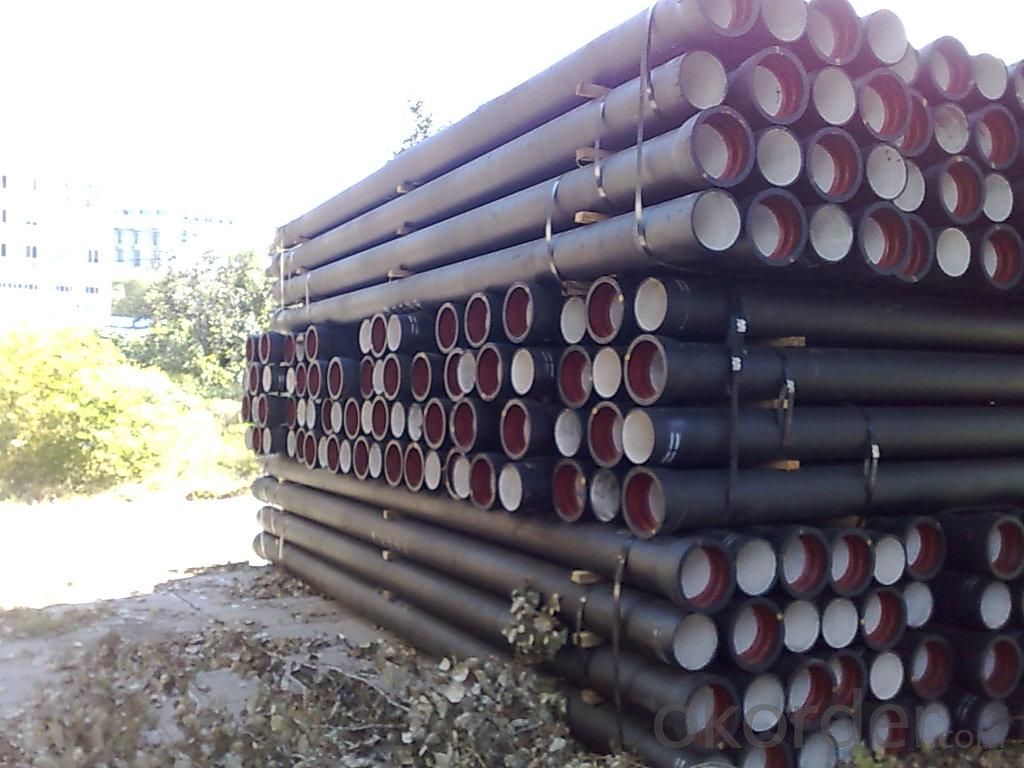
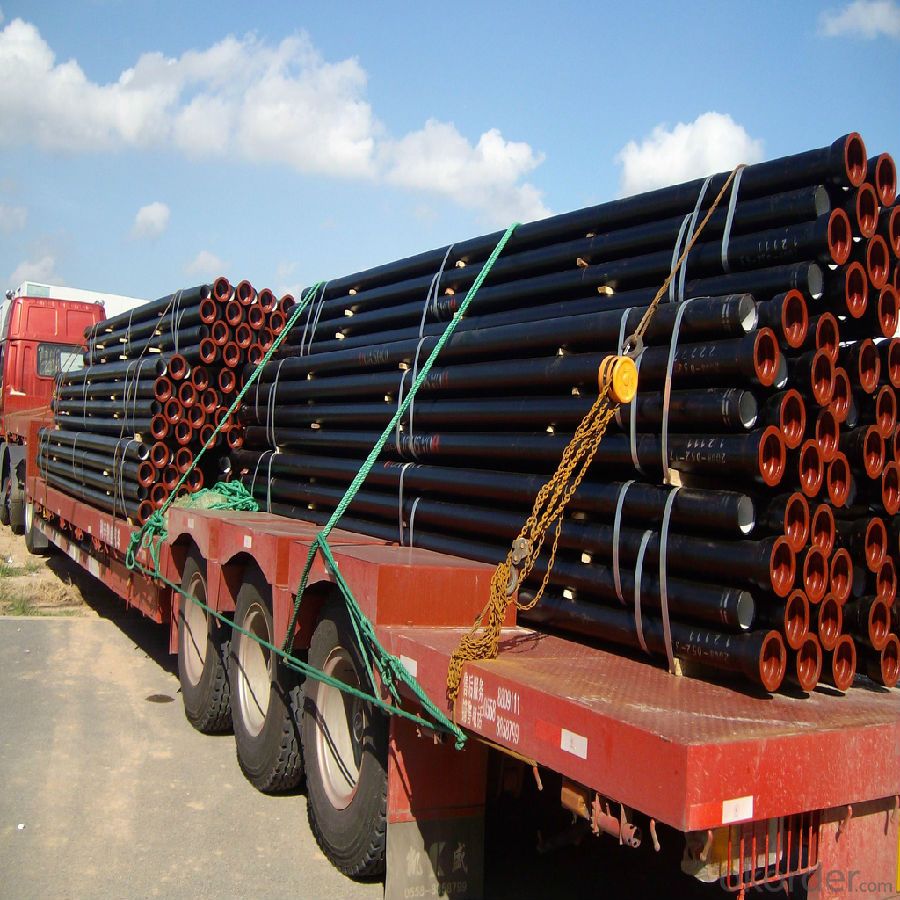
4. Ductile Iron Pipe Specification:
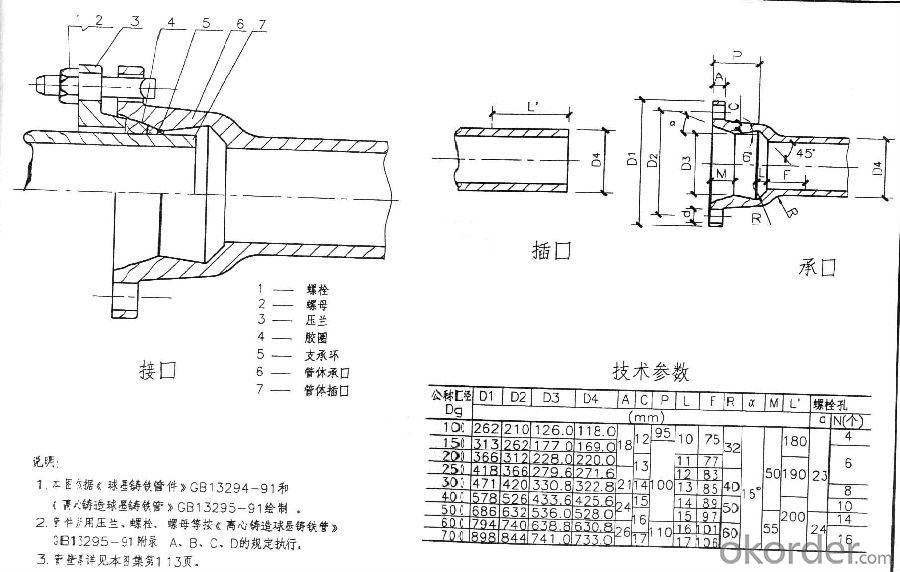
5.FAQ:
We have organized several common questions for our clients,may help you sincerely:
1.Q: Why would you choose ductile iron pipe rather than other pipe materials?
A:The reasons are obvious for that not only ductile iron pipe possesses the inherent strength and flexibility of ductile iron, combined with proven corrosion protection systems, but also the cost savings can be achieved from design to installation and commissioning.
2.Q:Why can you guarantee the inner of pipes can’t be corroded?
A: High alumina cement mortar lining and sulphate-resistant cement mortar lining. These two special linings are applicable to inner anti-corrosion for sewage pipes, improving resistance to erosion of the sewage components.
- Q: How do ductile iron pipes perform in cold weather conditions?
- Ductile iron pipes perform well in cold weather conditions due to their exceptional strength and durability. Unlike other materials, ductile iron pipes have a high resistance to freeze-thaw cycles, preventing them from cracking or breaking in freezing temperatures. Additionally, the material's flexibility allows for minimal expansion and contraction, ensuring stability even in extreme cold. Overall, ductile iron pipes are a reliable choice for cold weather environments.
- Q: Can ductile iron pipe be used for potable water systems?
- Yes, ductile iron pipe can be used for potable water systems. Ductile iron is a strong and durable material that is resistant to corrosion and can withstand high pressure and flow rates. It has been widely used in potable water systems for many years due to its reliability and longevity. However, it is important to ensure that the pipe is properly coated or lined to prevent any leaching of iron into the water.
- Q: Can ductile iron pipes be used in acidic environments?
- Yes, ductile iron pipes can be used in acidic environments. Ductile iron pipes have a high resistance to corrosion, making them suitable for various applications including acidic environments. The high carbon content in ductile iron pipes creates a protective layer on the surface of the pipe, preventing the acid from directly attacking the iron. Additionally, the inner lining of the pipe can be coated with epoxy or other protective materials to further enhance its resistance to corrosion in acidic conditions. However, it is important to consider the specific concentration and type of acid present in the environment, as certain acids may still cause corrosion over time. Consulting with experts or manufacturers is recommended to ensure appropriate material selection for specific acidic environments.
- Q: Does the cast iron pipe need separate corrosion protection?
- Ductile iron is characterized by its ease of decay and deformation, so if it is not a particular requirement, there is no need to do it alone
- Q: How do ductile iron pipes handle cyclic loading in offshore applications?
- Ductile iron pipes possess remarkable strength and durability, rendering them suitable for a wide range of applications, including offshore usage. When it comes to dealing with cyclic loading in offshore settings, ductile iron pipes boast various characteristics that contribute to their exceptional performance. To begin with, ductile iron pipes demonstrate a high resistance to fatigue failure. Fatigue failure occurs when a material undergoes repeated stress cycles, leading to the initiation and propagation of cracks over time. Ductile iron pipes are specifically designed to endure cyclic loading without compromising their structural integrity. This is made possible by their inherent ductility and ability to effectively absorb and distribute stress. Furthermore, ductile iron pipes exhibit outstanding impact resistance. Offshore environments are prone to dynamic and unpredictable forces, such as waves and currents, which can exert sudden and intense loads on the pipes. The superior impact resistance of ductile iron allows it to withstand these forces without experiencing deformation or fractures, ensuring that the pipes remain intact and fully functional. Moreover, ductile iron pipes possess a unique microstructure that enables them to resist corrosion. Offshore applications expose pipes to harsh environmental conditions, including saltwater, which can accelerate the corrosion process. However, the protective graphite matrix present in ductile iron pipes acts as a barrier, preventing corrosive agents from reaching the underlying metal. As a result, the service life of the pipes is significantly prolonged. Additionally, ductile iron pipes have a high load-carrying capacity. In offshore applications, pipes often need to support heavy loads, such as those exerted by equipment, structures, or seabed settlements. The exceptional strength of ductile iron enables it to effectively bear these loads, ensuring the structural integrity and stability of the entire system. Lastly, ductile iron pipes offer ease of installation and maintenance. Their lightweight nature makes them easier to handle and transport during offshore operations. Furthermore, their corrosion resistance reduces the need for frequent maintenance, minimizing downtime and reducing the costs associated with repairs and replacements. In conclusion, ductile iron pipes exhibit excellent performance when it comes to handling cyclic loading in offshore applications. Their resistance to fatigue failure, impact resistance, corrosion resistance, high load-carrying capacity, and ease of installation and maintenance make them a dependable and efficient choice for offshore environments.
- Q: What are the typical bedding and backfill requirements for ductile iron pipes?
- The typical bedding and backfill requirements for ductile iron pipes involve using a granular material, such as sand or gravel, to provide proper support and cushioning for the pipe. The bedding material should be placed evenly around the entire circumference of the pipe, ensuring that it is in direct contact with the bottom of the pipe and extending to a certain height above it. Backfill material, on the other hand, is used to fill the remaining space around the pipe and should be placed in layers and compacted to prevent settlement. Additionally, proper compaction and compaction equipment should be used to ensure the stability and long-term performance of the ductile iron pipes.
- Q: Are ductile iron pipes suitable for airport runway drainage?
- Yes, ductile iron pipes are suitable for airport runway drainage. Ductile iron pipes have excellent strength and durability, making them capable of withstanding heavy loads and extreme conditions, which are often encountered in airport operations. They are resistant to corrosion, which is crucial in a drainage system that may be exposed to various chemicals and environmental factors. Ductile iron pipes also have smooth inner surfaces, allowing for efficient flow of water and preventing blockages that could disrupt the drainage system. Additionally, they are easy to install and maintain, making them a reliable choice for airport runway drainage systems.
- Q: Are ductile iron pipes suitable for installation in areas with high soil settlement and consolidation?
- Ductile iron pipes are generally considered suitable for installation in areas with high soil settlement and consolidation. One of the key advantages of ductile iron pipes is their ability to withstand external loads and accommodate ground movement. Ductile iron pipes are known for their high strength and flexibility, making them more resistant to soil settlement and consolidation compared to other pipe materials. They have a higher tensile strength and can withstand heavy loads and ground vibrations without cracking or breaking. This makes them suitable for areas where the soil is prone to settlement and consolidation. Furthermore, ductile iron pipes have a high resistance to corrosion and can withstand aggressive soil conditions, which is often associated with areas prone to settlement and consolidation. They are also less susceptible to damage from external factors such as roots or rocks, which further enhances their suitability for installation in such areas. It is important, however, to consider the specific conditions of the site and consult with engineers or experts familiar with the local soil conditions. Factors such as the magnitude and rate of settlement, soil type, groundwater levels, and construction methods should be taken into account when determining the appropriateness of ductile iron pipes for installation in areas with high soil settlement and consolidation. In conclusion, ductile iron pipes are generally suitable for installation in areas with high soil settlement and consolidation. Their high strength, flexibility, resistance to corrosion, and ability to withstand external loads make them a reliable choice for such conditions. Nonetheless, it is always recommended to assess the specific site conditions and consult with professionals to ensure the most appropriate pipe material is chosen for each project.
- Q: Can ductile iron pipes be used in areas with high levels of groundwater contamination?
- Ductile iron pipes can be used in areas with high levels of groundwater contamination. Ductile iron is a strong and durable material that is resistant to corrosion, making it suitable for various environments, including those with contaminated groundwater. It offers a high level of resistance to chemicals and can withstand the corrosive effects of contaminants that may be present in the groundwater. Additionally, ductile iron pipes have a protective lining which further enhances their resistance to corrosion. However, it is important to note that the suitability of ductile iron pipes in such areas also depends on the specific nature and concentration of contaminants present in the groundwater. Consultation with experts and adherence to local regulations and industry standards is crucial to ensure the appropriate selection and installation of pipes for areas with high levels of groundwater contamination.
- Q: Can ductile iron pipes be used for pressure surge applications?
- Yes, ductile iron pipes can be used for pressure surge applications. Ductile iron pipes have excellent strength and durability, making them suitable for handling surge pressures caused by sudden changes in flow rates or water hammer events. They can withstand high internal pressures and have a high resistance to impact and fatigue. Additionally, ductile iron pipes have a smooth interior surface that allows for efficient flow of fluids, minimizing the potential for pressure surges. However, it is important to consider factors such as pipe size, wall thickness, and proper installation techniques to ensure the pipes can safely handle the specific pressure surge conditions in a given application. Consulting with a professional engineer or pipe manufacturer is recommended to determine the suitability of ductile iron pipes for pressure surge applications.
Send your message to us
Ductile Iron Pipe of China C40 EN545/EN598/ISO2531 on Chip Price
- Loading Port:
- China main port
- Payment Terms:
- TT or LC
- Min Order Qty:
- 23 m.t.
- Supply Capability:
- 500000 m.t./month
OKorder Service Pledge
OKorder Financial Service
Similar products
Hot products
Hot Searches
Related keywords
